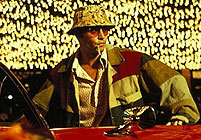|
|
|
|
Fear
and Loathing in Las Vegas
|
 |
|
1998 was not a good year for some of the world's finest directors. Clint Eastwood (Midnight in the Garden of Good and Evil, 1997), Joel Coen (The Big Lebowski) and Terry Gilliam all bit the dust in a rather spectacular fashion. Gilliam's Fear and Loathing in Las Vegas, adapted from Hunter S. Thompson's book, may well be the least redeemable of all these shockers. If you have seen the trailer, you scarcely need to see the movie. This is not because the promo gives away what precious little plot exists, but because the film's style is relentlessly monotonal and unvaried. Gilliam strikes a note of faux-surreal wackiness early on – askew angles, grotesque over-acting, psychedelic colour, grossly kitsch set design – and never departs from it. Raoul Duke (Johnny Depp) and Dr Gonzo (Benicio Del Toro) burn into Las Vegas high on every pharmaceutical substance available to them. They outrage a few innocent citizens, trash a couple of hotel rooms, try to crash a Debbie Reynolds concert and wander into an anti-drugs convention populated by police. This vague procession of events is strained through endless hallucinatory episodes, flashbacks and fantasies. Rarely has such a busy, cluttered film been about so little. Gilliam finds in Thompson the most fashionable theme of our time: 1971, in this romantic account, marks the end of a Golden Era in life, thought, art and politics, the sad moment when the 1960s radicals (as Camille Paglia likes to say) "hit the wall of reality". This is the dubious Boogie Nights (1997) formula, only with a different bag of drugs. Beware any filmmaker who promotes his or her work as a fearless attack against the political correctness of the '90s. This smug war cry – last refuge of a conservative – usually only announces a tired, old litany of supposedly tasteless and shocking transgressions. But there is nothing the least bit thrilling or confronting in Gilliam's effort; just a weary display of unimaginative bad manners. Beware also the filmmaker who pushes his thoroughly mainstream work as the last word in liberated, freewheeling Gonzo Cinema. Gilliam's premeditated affectations bear no relation to radical experimentation in film now or in any era. The old Monkees comedy Head (1968) offers a more genuine blast. Undoubtedly the saddest fall in this movie is Depp's performance. He is a gifted actor with a particular talent for stylised mimicry, as Tim Burton's sublime Ed Wood (1994) proved. Under Gilliam's uncharitable direction, Depp as Thompson is a grating, repetitive bore. And Del Toro, an equally fine player, is wasted in a clichéd ethnic role that would not be out of place in a typical Cheech and Chong no-brainer. MORE Gilliam: The Fisher King, Lost in La Mancha, Twelve Monkeys © Adrian Martin July 1998 |
![]()